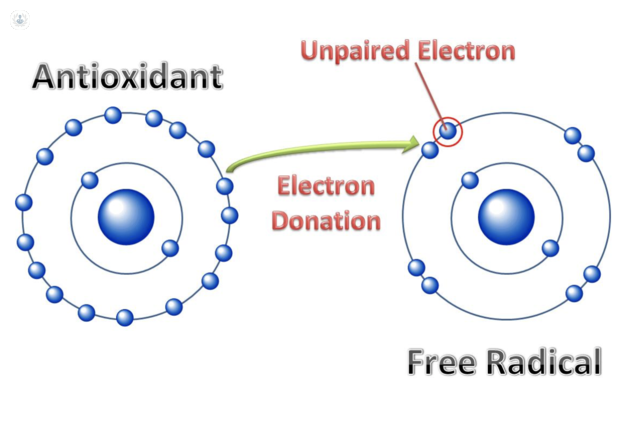Oxidative stress
Dr Sobia Arshad - Endocrinology, diabetes & metabolism
Created on: 02-19-2014
Updated on: 05-03-2023
Edited by: Carlota Pano
What is oxidative stress?
Oxidation is the natural process of your body reacting with oxygen as you breathe in and out.
In this process, molecules known as free radicals are produced. These are oxygen-containing molecules which have one or more unpaired electrons. The molecule then “steals” an electron from another molecule in order to stabilise.
Not all free radicals are harmful to the body – some are useful in killing pathogens. However, others might damage cells within your body, such as DNA cells or protein cells, stealing their electrons in order to stabilise. Normally, antioxidants within the body pair with the free radical and “lend” them an electron, neutralising them before they can cause cell damage.
Oxidative stress is where there is an imbalance between the free radicals in the body and the antioxidants available to fight them.

What are the consequences of oxidative stress?
It is suspected that oxidative stress plays a role in a large number of diseases, including cancers, multiple sclerosis, inflammatory conditions, and heart disease. However, this hasn’t been proven, and research to determine whether this is the case is still ongoing.
Until recently, it was believed that oxidative stress was a key factor in ageing. However, more recent studies have shown no link between damage from oxidative stress and lifespan, and ageing is now believed to be a much more complicated process.
How is oxidative stress treated?
Oxidative stress can be mitigated by having a diet rich in antioxidants. Foods rich in vitamin E and vitamin C, such as fruit, vegetables, pulses, and grains, all contain antioxidants.
It’s important to note that there is no evidence to suggest that vitamin supplements combat oxidative stress, and some types of antioxidant supplements have been found to actually increase the chances of developing prostate cancer, lung cancer, stroke.
